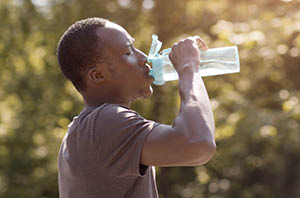Summer Brain Health Safety Tips
It’s easy to think of dehydration as a minor inconvenience—just a little thirst. But when it comes to your brain, dehydration can have surprisingly serious effects.
During the hot summer months, dehydration becomes more common and can impact everything from your memory to your mood. Summer brain health safety means understanding how something as simple as fluid loss can disrupt cognitive function and increase risk of injury.
Protecting your brain starts with understanding just how essential hydration really is.
Why Your Brain Needs Water
Your brain is about 75% water. Every thought you think, every movement you make, and every memory you form relies on proper hydration.
When your body loses more fluids than it takes in (even mildly), your brain’s ability to function properly can be affected.
- Reduced Cognitive Performance: Even mild dehydration (as little as 1–2% loss in body weight) can impair attention, memory, and motor skills.
- Mood Changes: Dehydration has been linked to increased feelings of anxiety, tension, and fatigue.
- Delayed Reaction Times: Slower processing and poor coordination are common when you’re even slightly dehydrated.
Source: According to the National Institutes of Health (NIH), dehydration can significantly reduce brain volume, affecting performance on cognitive tasks.
Who’s Most at Risk During Summer?
- Children: They lose body fluids faster and often don’t recognize thirst cues.
- Older Adults: Natural decreases in thirst perception can lead to underhydration.
- Athletes and Outdoor Enthusiasts: Increased sweating and activity make them especially vulnerable.
In the Minnesota summers, staying vigilant about hydration is crucial whether you’re biking around Coon Rapids or hiking near Golden Valley.
Signs of Dehydration You Shouldn’t Ignore
- Persistent headaches
- Dizziness or light-headedness
- Fatigue
- Difficulty concentrating
- Dry mouth or cracked lips
If you experience these symptoms, it’s time to rehydrate—immediately.

Simple Ways to Stay Brain-Hydrated
- Don’t Wait Until You’re Thirsty
- Thirst is a late signal! Aim to sip water throughout the day, especially before and after outdoor activities.
- Eat Your Water
- Snack on water-rich foods like cucumbers, watermelon, strawberries, and oranges.
- Choose Electrolyte Boosters When Needed
- After intense sweating, replenish with beverages that replace electrolytes—just watch for added sugars.
- Cool It Down
- Shade breaks, lightweight clothing, and cooling towels can reduce fluid loss from sweating.
Brain-Boosting Hydration Foods
- Cucumbers: 95% water content—an easy snack with crunch!
- Watermelon: Sweet, hydrating, and packed with antioxidants like lycopene.
- Celery: High in water and a good source of potassium and vitamin K.
- Strawberries: Hydrating and full of brain-friendly antioxidants.
- Oranges: Vitamin C for immunity and hydration all in one.
Fun fact: Hydrating foods can account for 20% or more of your daily water intake

Stay Sharp, Stay Hydrated
Brain fog, fatigue, and headaches don’t have to be part of your summer. Keeping your brain hydrated is one of the easiest ways to support mental clarity, mood, and performance.
Making summer brain health safety a priority can help you stay energized and alert all season long.
If you’re concerned about the effects of dehydration on your health, or you experience persistent cognitive symptoms, request an appointment or ask for a referral with our experts at the Minneapolis Clinic of Neurology.



